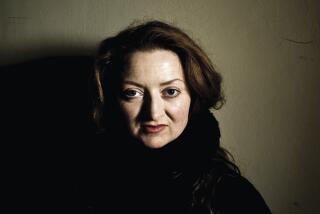Bosnians Are Worlds, and Words, Apart
- Share via
SARAJEVO, Bosnia-Herzegovina — Arrayed next to the cash register at this capital’s largest bookstore, the collection of Islamic primers includes how-tos on marriage, dress, sex, food and the treatment of nonbelievers.
Volumes such as “Islamic Bon Ton,” written in the local Bosnian language, are the newest bestsellers in a city slowly reviving from a numbing war when books more often served as firewood.
“People are asking for these titles,” the manager at the Svjetlost bookstore said. “This sort of information was traditionally not available here.”
Religion that was suppressed during Yugoslavia’s communism, and then became a pretext for warfare as Yugoslavia disintegrated, is now the stuff of local literature.
Sarajevo was never the Islamic fundamentalist bastion that rival Serbs, who are Orthodox Christian, tried to portray. But today, there is an increasing influence of Islam as once-secular Muslims turn to stricter observance.
More and more women wear head scarves and gown-like dresses. Butchers now declare their shops to be halal, the Islamic equivalent of kosher.
Many see the trend as a natural attempt to discover and preserve cultural identity after a war that divided people along religious lines. Others see a more ominous form of Islamization, inspired by Iran and Saudi Arabia, that is exclusionary and attempts to force out non-Muslims.
Those views tend to further undermine the Bosnians’ fast-dying tradition of multiethnic tolerance, and this comes as some Muslim political leaders openly debate forming a separate Islamic state and as discrimination against minority Croats and Serbs in Sarajevo is increasing.
Besides “Islamic Bon Ton,” an etiquette manual written 15 years ago and reissued now by Sarajevo’s leading publisher, Sahinpasic, another bestseller is the much more conservative “Halal and Haram,” or “Pure and Impure.” It is written by a noted Egyptian scholar with a foreword by Dzemaludin Latic, former editor of a Sarajevo newspaper and close ally of Muslim President Alija Izetbegovic.
“Halal and Haram” tells women they must cover all but their face and hands. It is forbidden to have dogs unless they are for hunting or protection. And a man may take several wives, the manual says, since a single wife may not be able to satisfy his sexual needs. How influential this book will be remains to be seen.
For most Sarajevo Muslims, Latic laments, “Islam is still marginal, Arabic, exotic--something that cannot fit into contemporary life and, accordingly, its place is in the museum.”
He blames “ideological shackles” such as communism, atheism and “Western mediation,” but urges all Bosnian Muslims to adhere to Islam--in politics and in public and private life--as the only way to preserve their people.
“Our special, small, wounded, surrounded nation can survive only by sticking to the Koran,” he writes.
Another sign of Bosnia’s cultural times as seen in the bookstores is a fast-selling new dictionary and spelling textbook for the “Bosnian language.”
Before the war, citizens of the former Yugoslavia spoke roughly the same language, Serbo-Croat, with regional differences.
But today, the nationalist regimes that rule Muslim, Serbian and Croatian parts of Bosnia are adding new words and changing spellings and pronunciations to distinguish their languages.
The dictionary’s author says its purpose is to help Bosnians with the transition to their new form of speech. It takes 650 rules to do this, and the only substantial difference appears to be the addition of the letter “h” to the spelling of many common words. Ajvar, a popular pepper relish, becomes hajvar.
“Was it worth writing a new dictionary just to get the word Bosnian on the cover?” asked Yugoslav linguist Ivan Klajn, writing in a Belgrade magazine. “To those who published its 25,000 copies, on expensive paper with leather binding, it was obviously worth it. But only for political--and in no way linguistic--reasons.”
The “h” may give the language more of a Turkish flavor, but many native Sarajevans are rebelling, saying some of the pronunciations sound ridiculous and uneducated. The new dictionary is in schools as a textbook.
At the same time, Bosnian Serb leaders issued new rules, forbidding the use of the Latin alphabet and ordering television broadcasters, among others, to speak in an accent more typical of Belgrade than Bosnia.
More to Read
Sign up for our Book Club newsletter
Get the latest news, events and more from the Los Angeles Times Book Club, and help us get L.A. reading and talking.
You may occasionally receive promotional content from the Los Angeles Times.







